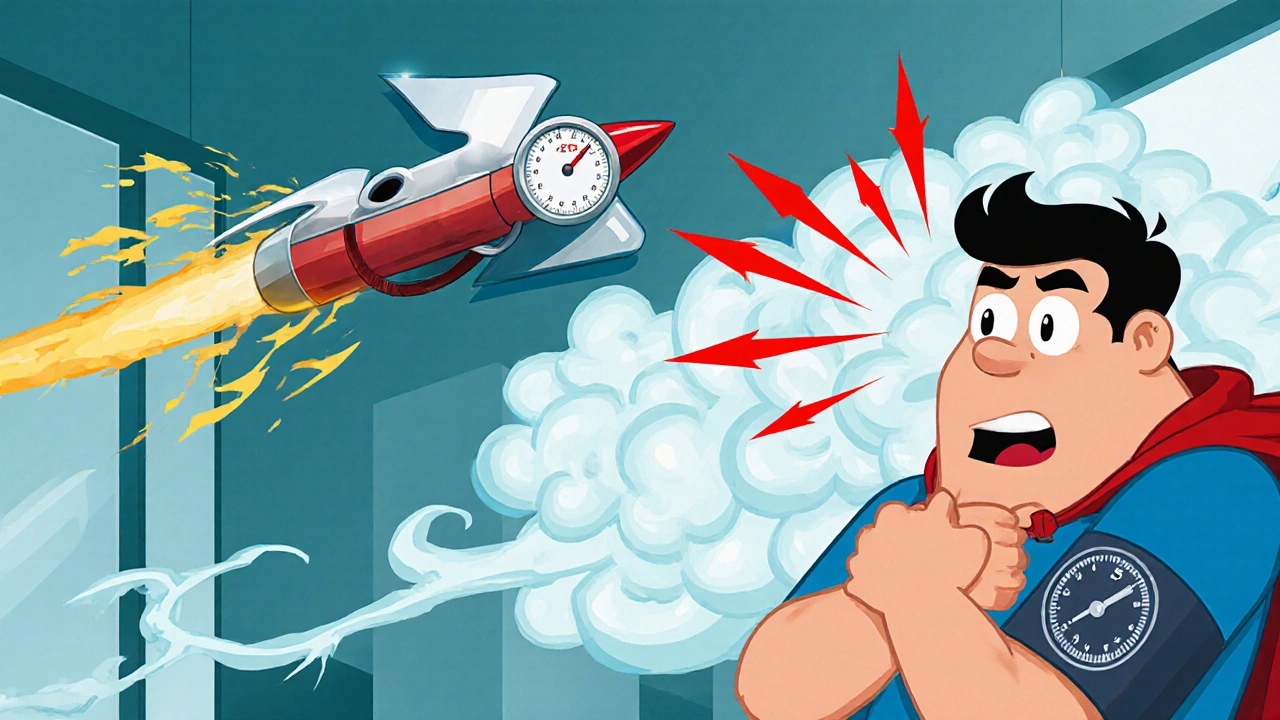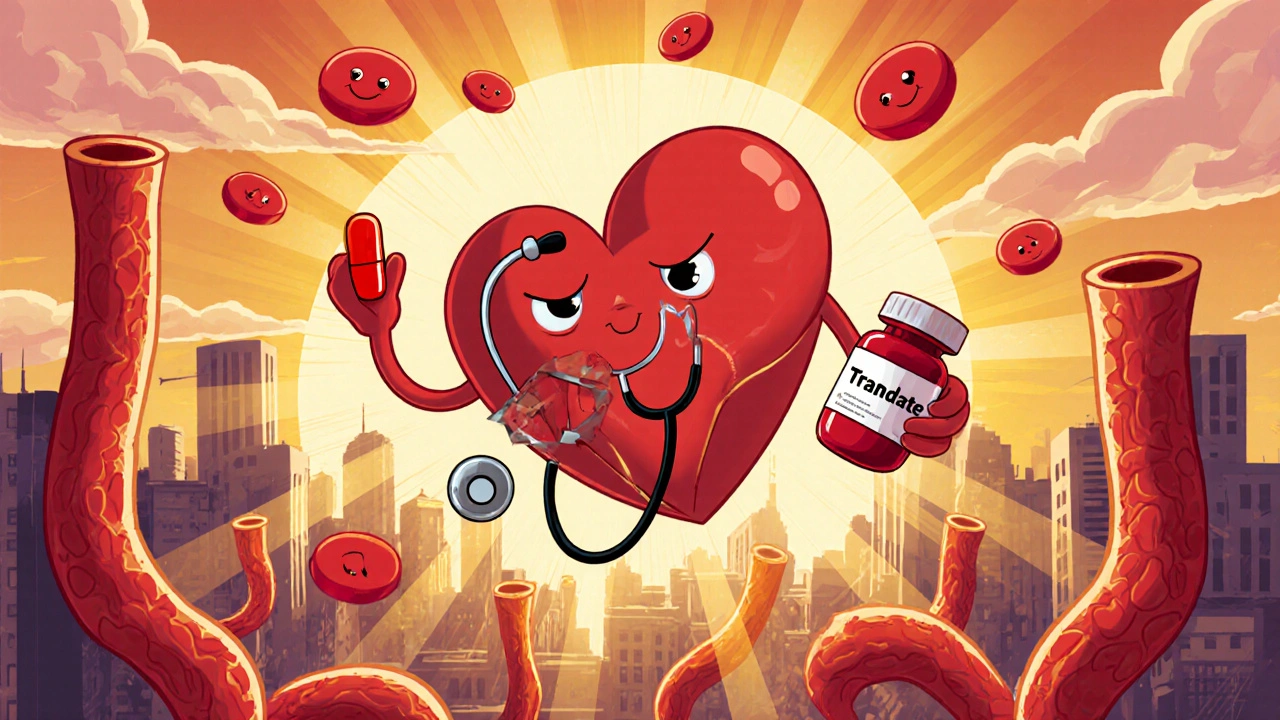Trandate is the brand name for the drug labetalol, a medication used to treat high blood pressure. It’s not a new drug, but it’s still widely prescribed - especially in cases where other blood pressure medicines haven’t worked well or when patients need fast, controlled results. Unlike some other antihypertensives, Trandate works in two ways: it blocks both alpha and beta receptors in your body. This dual action helps relax blood vessels and slow your heart rate, lowering blood pressure without causing the same level of dizziness or fatigue as older drugs.
How Trandate Lowers Blood Pressure
Trandate doesn’t just reduce your heart rate - it also widens your arteries. That’s because it blocks alpha-1 receptors, which normally cause blood vessels to tighten. When those receptors are blocked, blood flows more easily. At the same time, by blocking beta receptors, it reduces the force and speed of your heartbeat. Together, these effects cut down the pressure inside your blood vessels.
This makes Trandate especially useful for people with hypertension who also have heart conditions. For example, someone with angina or a history of heart attack might benefit more from Trandate than from a pure beta-blocker like metoprolol. The alpha-blocking effect helps prevent the blood vessel constriction that can trigger chest pain.
Who Gets Prescribed Trandate?
Doctors often choose Trandate for three main groups:
- Patients with moderate to severe high blood pressure that hasn’t responded to other medications
- Pregnant women with preeclampsia or gestational hypertension - Trandate is one of the few blood pressure drugs considered safe during pregnancy
- People experiencing hypertensive emergencies, where blood pressure spikes dangerously high and needs quick control
In New Zealand, where hypertension affects nearly one in three adults over 45, Trandate is commonly used in hospitals and outpatient clinics. It’s not usually the first choice for mild cases - that’s usually a diuretic or ACE inhibitor - but when things get serious, Trandate steps in.
Dosage and How to Take It
Trandate comes in tablet form and is taken by mouth. The starting dose is usually 100 mg twice a day. Your doctor may increase it gradually, depending on how your body responds. Most people end up taking between 200 mg and 400 mg per day, split into two doses. Some patients with severe hypertension may need up to 1,200 mg daily, but that’s rare and always monitored closely.
You can take Trandate with or without food. But if you get nauseous, taking it with a light meal helps. It’s important to take it at the same times each day. Skipping doses or stopping suddenly can cause your blood pressure to spike - sometimes dangerously so. That’s why doctors always warn against quitting Trandate without medical advice.
Common Side Effects and What to Watch For
Most people tolerate Trandate well. But side effects do happen. The most common ones include:
- Dizziness, especially when standing up quickly
- Fatigue or feeling unusually tired
- Nausea or upset stomach
- Scalp tingling or numbness
- Low heart rate (bradycardia)
These usually fade after a few weeks as your body adjusts. But if you feel faint, have trouble breathing, or notice swelling in your legs or face, stop taking it and call your doctor immediately. Those could be signs of a serious reaction.
Trandate can also make asthma symptoms worse. If you have asthma or chronic lung disease, your doctor will need to weigh the risks carefully. It’s also not recommended for people with severe heart failure or certain types of heart block.

Trandate vs. Other Blood Pressure Medications
How does Trandate compare to other drugs? Here’s a quick breakdown:
| Medication | Primary Action | Best For | Common Side Effects |
|---|---|---|---|
| Trandate | Alpha and beta blockade | Severe hypertension, pregnancy, emergencies | Dizziness, fatigue, low heart rate |
| Metoprolol | Beta blockade only | Heart rhythm issues, post-heart attack | Cold hands, sleep problems, depression |
| Lisinopril | ACE inhibition | Diabetics, kidney protection | Cough, high potassium, dizziness |
| Amlodipine | Calcium channel blocker | Elderly patients, isolated systolic hypertension | Ankle swelling, flushing, headache |
| Hydrochlorothiazide | Diuretic | Mild hypertension, fluid retention | Dehydration, low sodium, frequent urination |
Trandate stands out because of its dual mechanism. Other drugs might lower pressure, but Trandate does it without over-slowing the heart or causing excessive fluid loss. That’s why it’s often chosen when patients need a balanced approach.
What Happens If You Stop Taking Trandate?
Stopping Trandate suddenly can be risky. Your body has adjusted to the drug’s effects. If you quit cold turkey, your blood pressure can rebound - sometimes to levels higher than before you started. This is called rebound hypertension.
In some cases, people have had heart attacks or strokes after abruptly stopping beta-blockers like Trandate. That’s why doctors always taper the dose slowly over days or weeks. Never reduce or stop the medication on your own, even if you feel fine.
Drug Interactions to Avoid
Trandate can interact with other medications. Some of the most important ones include:
- Calcium channel blockers (like verapamil or diltiazem) - can cause dangerously slow heart rates
- Insulin or diabetes medications - Trandate can mask symptoms of low blood sugar
- Nonsteroidal anti-inflammatory drugs (NSAIDs) like ibuprofen - may reduce Trandate’s effectiveness
- Antidepressants like SSRIs - can increase the risk of low blood pressure
Always tell your doctor or pharmacist about every supplement, herb, or over-the-counter medicine you’re taking. Even something as simple as a cold remedy can interfere.

Trandate in Pregnancy and Breastfeeding
Trandate is one of the few blood pressure medications considered safe during pregnancy. It crosses the placenta, but studies show no major increase in birth defects. In fact, it’s often the go-to drug for treating preeclampsia - a dangerous condition where high blood pressure damages the mother’s organs.
It’s also considered safe during breastfeeding. Only tiny amounts pass into breast milk, and no adverse effects have been reported in nursing infants. Still, your doctor will monitor both you and your baby closely.
How Long Does It Take to Work?
When taken orally, Trandate starts lowering blood pressure within 2 hours. Peak effect happens around 2 to 4 hours after taking it. For people in a hypertensive emergency, doctors sometimes give it intravenously - then the effect kicks in within minutes.
But for daily use, it takes about 2 to 3 weeks to reach full effect. Don’t expect instant results. Even if your blood pressure doesn’t drop right away, keep taking it. The real benefit comes from consistent use over time.
What to Do If You Miss a Dose
If you forget a dose, take it as soon as you remember. But if it’s almost time for your next dose, skip the missed one. Don’t double up. Taking too much at once can cause your heart rate to drop too low or your blood pressure to fall dangerously.
Set a daily alarm on your phone. Or use a pill organizer. Missing doses is one of the top reasons Trandate stops working for people.
Is Trandate the same as labetalol?
Yes. Trandate is the brand name for labetalol. The active ingredient is identical. Generic labetalol is just as effective and usually much cheaper. Most doctors will prescribe the generic unless there’s a specific reason to use the brand.
Can I drink alcohol while taking Trandate?
It’s best to avoid alcohol. Both Trandate and alcohol lower blood pressure. Together, they can cause extreme dizziness, fainting, or falls - especially in older adults. Even one drink can increase these risks.
Does Trandate cause weight gain?
Unlike some beta-blockers, Trandate doesn’t typically cause weight gain. In fact, because it doesn’t slow metabolism as much as older drugs, it’s often preferred for patients concerned about weight. Still, fluid retention can happen in rare cases.
How often should my blood pressure be checked on Trandate?
When you first start, your doctor will want to check your blood pressure every 1 to 2 weeks. Once it’s stable, monthly checks are usually enough. If you’re pregnant or have kidney disease, you may need more frequent monitoring.
Can Trandate be used for anxiety?
Some doctors prescribe Trandate off-label for performance anxiety or social anxiety because it reduces physical symptoms like rapid heartbeat and shaking. But it doesn’t treat the psychological part of anxiety. For long-term anxiety, therapy or SSRIs are more effective.
Final Thoughts: Is Trandate Right for You?
Trandate isn’t for everyone. But for those with stubborn high blood pressure, pregnancy-related hypertension, or a need for rapid control, it’s a powerful tool. Its dual mechanism gives it an edge over single-action drugs. It’s also one of the few options safe for pregnant women - a major advantage when other treatments are off-limits.
The key to success is consistency. Take it as directed. Don’t skip doses. Watch for side effects. And always talk to your doctor before making changes. High blood pressure often has no symptoms, but the damage it causes is real. Trandate helps prevent that damage - if you let it work.


12 Comments
Brandon Lowi
Trandate? That’s the drug they give you when the pharmaceutical conglomerates run out of patentable junk to shove down your throat. Alpha-beta blockade? Sounds like a Wall Street hedge fund strategy for your circulatory system. They don’t want you healthy-they want you dependent. And don’t get me started on how they market this as ‘safe for pregnancy’-like that’s some kind of virtue. It’s just another chemical leash for the masses.
Richard Couron
wait so trandate is just labetalol?? then why the hell do they charge 300 bucks for it?? i got the generic for 12 bucks at walmarts pharmacy. this is just another scam by big pharma to keep us poor. also i heard the FDA is in cahoots with the drug companies. they dont want you to know the truth. my cousin took it and his hair fell out. they wont admit it but its the glyphosate in the pills. i know what i saw.
Alex Boozan
From a clinical pharmacology standpoint, the dual alpha-1 and beta-adrenergic antagonism of labetalol provides a hemodynamically favorable profile compared to monotherapy agents. The absence of significant reflex tachycardia, coupled with reduced peripheral resistance, makes it uniquely suited for hypertensive urgencies. The pharmacokinetic half-life of approximately 6 hours necessitates bid dosing to maintain therapeutic plasma concentrations. Furthermore, its low hepatic extraction ratio reduces first-pass metabolism variability-a key advantage over propranolol. The absence of significant CYP450 interactions further supports its utility in polypharmacy regimens.
mithun mohanta
Oh wow. Trandate. How… quaint. I mean, really? We’re still using 1970s pharmacology when we could be using CRISPR-edited endothelial cells or AI-driven nanobots to modulate vascular tone? But no-let’s just keep throwing old-school beta-blockers at people like it’s a medieval cure for the plague. I mean, I’ve read the entire Pharmacopoeia of the Future (2041 edition) and let me tell you, this is just… embarrassing. We’re not curing hypertension. We’re just managing symptoms while the planet burns. And don’t even get me started on the glyphosate contamination in the fillers.
Ram tech
why even bother with this? just drink celery juice and do yoga. my uncle had high bp and he stopped all meds and now he’s fine. trandate? sounds like a brand of energy drink.
Jeff Hakojarvi
Hey, I’m glad this post exists. I was just diagnosed with gestational hypertension last week and my OB just prescribed Trandate. I was terrified-I thought I’d have to go on insulin or something. This breakdown helped so much. I didn’t realize it was safe during pregnancy. I’ve been so worried about the baby. Just wanted to say thanks for the clarity. Also, if anyone’s on it and has tips for dealing with the dizziness-especially when getting up at 3 a.m. to nurse-I’m all ears. I’ve been using a bedside chair to sit for a minute before standing. It’s helped.
Ancel Fortuin
Oh great. Another government-approved chemical sedative masquerading as medicine. Let me guess-next they’ll tell us Trandate prevents alien mind control? Because let’s be real: if this drug were truly safe and effective, why are we still seeing strokes in people taking it? And why does every single study get funded by Novartis? I’ve got a friend who took it for two weeks and woke up with tinnitus and a feeling that his thoughts were being ‘filtered.’ Coincidence? I think not.
Jonathan Gabriel
It’s fascinating how we’ve reduced complex physiological regulation to a single molecular interaction. Trandate doesn’t ‘fix’ hypertension-it just temporarily dampens the symptoms of a system under chronic stress. What if the real problem is inflammation? Or cortisol dysregulation? Or sleep apnea? We’re treating the symptom like it’s the disease. And yet… I still take it. Because sometimes, when your BP is 210/110, you don’t get to be philosophical. You just take the pill. And thank God for it.
Don Angel
Thanks for the detailed breakdown. I’ve been on Trandate for 8 months now after my heart attack. The dizziness was rough at first, but I learned to move slowly. I also started using a pill box with alarms-game changer. I’ve told three friends about this post. One of them just got prescribed it for preeclampsia. You saved her some panic. Really appreciate the clarity.
benedict nwokedi
Let’s be honest: Trandate is just another tool in the Great Medical Control Agenda. Alpha-beta blockade? That’s not science-that’s behavioral conditioning disguised as pharmacology. They don’t want you to heal. They want you to be docile. And don’t get me started on how they use ‘pregnancy safety’ as a Trojan horse to normalize lifelong dependency. The WHO has been quietly warning about this since 2012. But no one listens. Because the system is rigged.
kim pu
so trandate is labetalol?? okay but like… why is the brand name so… aggressive? trandate? sounds like a cyberpunk weapon from a 2077 game. also i heard if you mix it with weed your heart rate goes into the void. i did it once. i thought i was gonna die. i just laid on the floor and watched the ceiling spin. my cat stared at me like i was the weird one. worth it? maybe. but i’m not doing it again.
Shravan Jain
While the pharmacological profile of labetalol is indeed characterized by balanced alpha and beta antagonism, the clinical utility of this agent remains fundamentally constrained by its pharmacokinetic variability and the absence of long-term outcome data in non-pregnant populations. Furthermore, the normalization of its use in gestational hypertension-despite the absence of robust randomized controlled trials demonstrating perinatal mortality reduction-represents a paradigmatic failure of evidence-based medicine. The reliance on surrogate endpoints (e.g., BP reduction) as proxies for maternal-fetal safety is not merely methodologically flawed-it is ethically indefensible. One must question: are we treating disease, or merely managing compliance?